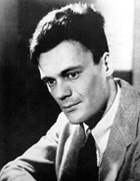Memories Of West Street And Lepke Poem by Robert Lowell
Memories Of West Street And Lepke
Only teaching on Tuesdays, book-worming
in pajamas fresh from the washer each morning,
I hog a whole house on Boston's
"hardly passionate Marlborough Street,"
where even the man
scavenging filth in the back alley trash cans,
has two children, a beach wagon, a helpmate,
and is "a young Republican."
I have a nine months' daughter,
young enough to be my granddaughter.
Like the sun she rises in her flame-flamingo infants' wear.
These are the tranquilized Fifties,
and I am forty. Ought I to regret my seedtime?
I was a fire-breathing Catholic C.O.,
and made my manic statement,
telling off the state and president, and then
sat waiting sentence in the bull pen
beside a negro boy with curlicues
of marijuana in his hair.
Given a year,
I walked on the roof of the West Street Jail, a short
enclosure like my school soccer court,
and saw the Hudson River once a day
through sooty clothesline entanglements
and bleaching khaki tenements.
Strolling, I yammered metaphysics with Abramowitz,
a jaundice-yellow ("it's really tan")
and fly-weight pacifist,
so vegetarian,
he wore rope shoes and preferred fallen fruit.
He tried to convert Bioff and Brown,
the Hollywood pimps, to his diet.
Hairy, muscular, suburban,
wearing chocolate double-breasted suits,
they blew their tops and beat him black and blue.
I was so out of things, I'd never heard
of the Jehovah's Witnesses.
"Are you a C.O.?" I asked a fellow jailbird.
"No," he answered, "I'm a J.W."
He taught me the "hospital tuck,"
and pointed out the T-shirted back
of Murder Incorporated's Czar Lepke,
there piling towels on a rack,
or dawdling off to his little segregated cell full
of things forbidden to the common man:
a portable radio, a dresser, two toy American
flags tied together with a ribbon of Easter palm.
Flabby, bald, lobotomized,
he drifted in a sheepish calm,
where no agonizing reappraisal
jarred his concentration on the electric chair
hanging like an oasis in his air
of lost connections....
In “Memories of West Street and Lepke” (1959) by Robert Lowell (1917-1977) , the speaker is imprisoned for a year as a “fire-breathing Catholic C.O.[ conscientious objector]” (14) along with Louis “Lepke” Buchalter, the boss of the infamous who organized crime gang murder. In this poem, Lowell is aiming for the irony of a situation in which the speaker, who refuses to kill, is incarcerated in the same place as a man who has been convicted for killing. Moreover, while the speaker in prison, he observes by shockingly looking at the way the prisoners being treated where they were “flabby, bald, lobotomized…” (24) .
In “Memories of West Street and Lepke” (1959) by Robert Lowell (1917-1977) , the speaker is imprisoned for a year as a “fire-breathing Catholic C.O.[ conscientious objector]” (14) along with Louis “Lepke” Buchalter, the boss of the infamous who organized crime gang murder. In this poem, Lowell is aiming for the irony of a situation in which the speaker, who refuses to kill, is incarcerated in the same place as a man who has been convicted for killing. Moreover, while the speaker in prison, he observes by shockingly looking at the way the prisoners being treated where they were “flabby, bald, lobotomized…” (24) .
This poem has not been translated into any other language yet.
I would like to translate this poem
'hanging like an oasis in his air/ of lost connections' Every syllable in this poem is perfect. If you can't understand the references, just listen to the music. It is a milestone in 20th Century American lit. Sad that the benighted readers have given it a '6.' It should be a 12 on poemhunter's 1 to 10 scale.